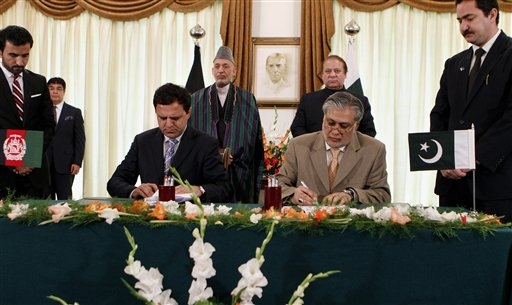
ISLAMABAD (AP) — Pakistan has decided to release the most senior Afghan Taliban prisoner it is holding and could do so as soon as this month to jumpstart the struggling peace process, a senior Pakistani official said Tuesday.
The Afghan government has long demanded that Pakistan release Mullah Abdul Ghani Baradar, the Taliban's former deputy leader. He was arrested in a joint raid with the CIA in the southern Pakistani city of Karachi in 2010.
Sartaj Aziz, adviser to the Pakistani prime minister on national security and foreign affairs, said the government has agreed to release Baradar to help the peace process but has not yet set a date.
"He could be released this month or very soon," said Aziz. "It is part of confidence building measures, and we are hopeful he can play a role."
Mohammad Ismail Qasimyar, secretary of the Afghan High Peace Council, which represents the government in peace talks, welcomed the news of Baradar's planned release.
"In the past, Abdul Ghani Baradar has been willing to help bring peace to Afghanistan. Because of that, they put him in jail," said Qasimyar. "I believe it is good for both Afghanistan and Pakistan to build trust, and this release is important."
The circumstances surrounding Baradar's arrest in Karachi were murky. Afghan officials said at the time that he was holding secret peace talks with the Afghan government and accused Pakistan of arresting him to sabotage the process or gain control of the talks.
Pakistan has strong historical ties to the Taliban since it helped the group seize control of Afghanistan in 1996. Pakistan is widely believed to have maintained these ties and provided the insurgents sanctuary, despite official denials.
But there is also significant distrust between the two, and Pakistan has arrested dozens of Taliban militants in the years following the U.S.-led invasion of Afghanistan in 2001 — possibly to hold as bargaining chips.
Pakistan has released at least 33 Taliban prisoners over the last year at the Afghan government's request in an attempt to jumpstart peace negotiations between the insurgents and Kabul.
Pakistan has increasingly pushed for a peace settlement because it is worried that chaos in Afghanistan following the withdrawal of most U.S. combat troops by the end of 2014 could make it more difficult to fight its own domestic Taliban militants. It could also send a flood of new refugees into Pakistan.
Pakistan's most recent release of Taliban prisoners came on Saturday when it set seven free. That was less than two weeks after Afghan President Hamid Karzai visited Islamabad and pushed for Pakistan's help in the peace process.
But there is no sign that the previous releases have helped peace talks, and some of the prisoners are believed to have returned to the fight against the Afghan government. The U.S. is reluctant to see Baradar released, believing he would also return to the battlefield, and has asked Pakistan to give notice if he is to be set free.
The most recent attempt to push forward peace negotiations foundered in June in the Qatari capital of Doha. The Afghan president pulled the plug on the talks even before they began because he was angered that the group marked the opening of its Doha political office with the flag, anthem and symbols of the Islamic Emirate of Afghanistan — the group's name when they ruled the country.
The Taliban have held secret talks with Karzai's representatives to try to restart the peace process, Afghan officials and a senior Taliban representative recently told The Associated Press. But it's unclear if they have made any headway.